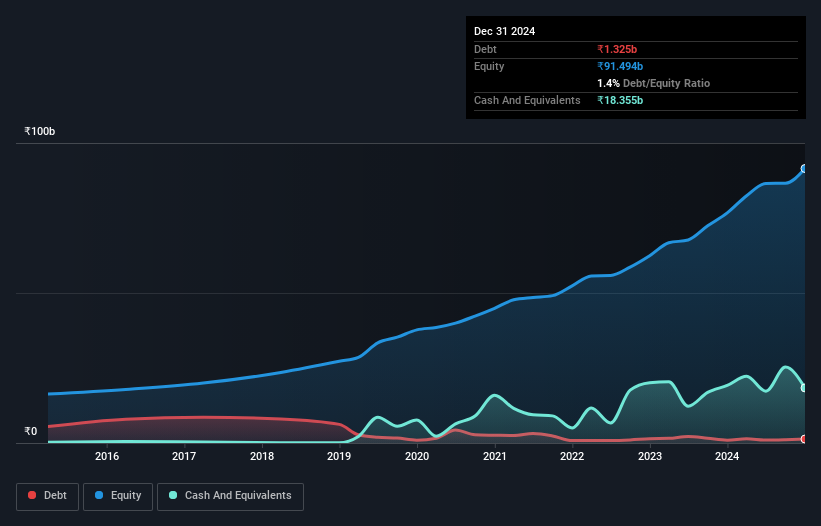- India
- /
- Electrical
- /
- NSEI:POLYCAB
These 4 Measures Indicate That Polycab India (NSE:POLYCAB) Is Using Debt Reasonably Well
The external fund manager backed by Berkshire Hathaway's Charlie Munger, Li Lu, makes no bones about it when he says 'The biggest investment risk is not the volatility of prices, but whether you will suffer a permanent loss of capital.' So it seems the smart money knows that debt - which is usually involved in bankruptcies - is a very important factor, when you assess how risky a company is. Importantly, Polycab India Limited (NSE:POLYCAB) does carry debt. But is this debt a concern to shareholders?
What Risk Does Debt Bring?
Generally speaking, debt only becomes a real problem when a company can't easily pay it off, either by raising capital or with its own cash flow. In the worst case scenario, a company can go bankrupt if it cannot pay its creditors. However, a more usual (but still expensive) situation is where a company must dilute shareholders at a cheap share price simply to get debt under control. Of course, debt can be an important tool in businesses, particularly capital heavy businesses. The first thing to do when considering how much debt a business uses is to look at its cash and debt together.
What Is Polycab India's Debt?
As you can see below, at the end of December 2024, Polycab India had ₹1.33b of debt, up from ₹931.8m a year ago. Click the image for more detail. However, its balance sheet shows it holds ₹18.4b in cash, so it actually has ₹17.0b net cash.

How Healthy Is Polycab India's Balance Sheet?
According to the last reported balance sheet, Polycab India had liabilities of ₹40.3b due within 12 months, and liabilities of ₹3.94b due beyond 12 months. Offsetting this, it had ₹18.4b in cash and ₹23.7b in receivables that were due within 12 months. So its liabilities outweigh the sum of its cash and (near-term) receivables by ₹2.14b.
This state of affairs indicates that Polycab India's balance sheet looks quite solid, as its total liabilities are just about equal to its liquid assets. So while it's hard to imagine that the ₹742.3b company is struggling for cash, we still think it's worth monitoring its balance sheet. While it does have liabilities worth noting, Polycab India also has more cash than debt, so we're pretty confident it can manage its debt safely.
Check out our latest analysis for Polycab India
Also good is that Polycab India grew its EBIT at 15% over the last year, further increasing its ability to manage debt. When analysing debt levels, the balance sheet is the obvious place to start. But ultimately the future profitability of the business will decide if Polycab India can strengthen its balance sheet over time. So if you want to see what the professionals think, you might find this free report on analyst profit forecasts to be interesting.
Finally, a company can only pay off debt with cold hard cash, not accounting profits. While Polycab India has net cash on its balance sheet, it's still worth taking a look at its ability to convert earnings before interest and tax (EBIT) to free cash flow, to help us understand how quickly it is building (or eroding) that cash balance. In the last three years, Polycab India's free cash flow amounted to 31% of its EBIT, less than we'd expect. That's not great, when it comes to paying down debt.
Summing Up
We could understand if investors are concerned about Polycab India's liabilities, but we can be reassured by the fact it has has net cash of ₹17.0b. And we liked the look of last year's 15% year-on-year EBIT growth. So we don't have any problem with Polycab India's use of debt. When analysing debt levels, the balance sheet is the obvious place to start. But ultimately, every company can contain risks that exist outside of the balance sheet. For example Polycab India has 2 warning signs (and 1 which is significant) we think you should know about.
When all is said and done, sometimes its easier to focus on companies that don't even need debt. Readers can access a list of growth stocks with zero net debt 100% free, right now.
New: Manage All Your Stock Portfolios in One Place
We've created the ultimate portfolio companion for stock investors, and it's free.
• Connect an unlimited number of Portfolios and see your total in one currency
• Be alerted to new Warning Signs or Risks via email or mobile
• Track the Fair Value of your stocks
Have feedback on this article? Concerned about the content? Get in touch with us directly. Alternatively, email editorial-team (at) simplywallst.com.
This article by Simply Wall St is general in nature. We provide commentary based on historical data and analyst forecasts only using an unbiased methodology and our articles are not intended to be financial advice. It does not constitute a recommendation to buy or sell any stock, and does not take account of your objectives, or your financial situation. We aim to bring you long-term focused analysis driven by fundamental data. Note that our analysis may not factor in the latest price-sensitive company announcements or qualitative material. Simply Wall St has no position in any stocks mentioned.
About NSEI:POLYCAB
Polycab India
Manufactures and sells wires and cables under the POLYCAB brand in India and internationally.
Outstanding track record with flawless balance sheet.
Similar Companies
Market Insights
Community Narratives




